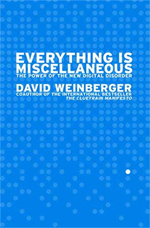To the librarians. So begins Everything is Miscellaneous, David Weinberger’s mesmerizing new book about organization, authority, and knowledge. I received my advance copy last week and read it in a single day. I found it interesting and inspiring, and I recommend it highly.

But, I don’t agree that everything is or will be or should be miscellaneous, and I don’t believe David is entirely fair to librarians, information architects, and other professional organizers.
The troubles begin with David’s taxonomy which divides the history of organization into a first, second, and third order of order. Implicit in this taxonomy lies the assertion of linear progress, a lossless swap of old for new, similar to the presumed step change into Web 2.0 that I challenged in Information Architecture 3.0.
In David’s book, the inevitability and desirability of this migration to miscellany is also made explicit:
When you go to a commercial Web site, the business owns and controls the information it wants to give you, the way you’ll navigate through that information, and the experience you’ll have while doing so…the miscellanizing of information, knowledge, and ideas rips these assets out of the hands of individual businesses…the most successful businesses will have to get over the second-order assumption that they own the customer’s experience. In a truly miscellaneous world, a successful business owns nothing but what it wants to sell us. The rest is ours.
It’s not that I disagree with David about the power and potential of user participation in the creation and organization of knowledge. But, I do believe that the old serves as foundation for and coexists with the new, or as I explained in Ambient Findability:
We don’t have to choose. Ontologies, taxonomies, and folksonomies are not mutually exclusive. In many contexts, such as corporate web sites, the formal structure of ontologies and taxonomies is worth the investment. In others, like the blogosphere, the casual serendipity of folksonomies is certainly better than nothing. And in some contexts, such as intranets and knowledge networks, a hybrid metadata ecology that combines elements of each may be ideal.
And, in fact, it’s the “third order” information-as-commodity companies like Amazon and eBay that have most aggressively and successfully integrated traditional and novel organization methods to create a positive (and profitable) customer experience.
Furthermore, while I agree with David that “second-order organization is often as much about authority as about making things easier to find” and that all taxonomies embed bias, the same can be said of search engines, books, blogs, Amazon, eBay, and the Wikipedia. This doesn’t negate the value and good intentions of librarians, information architects, authors, editors, designers, and users who labor to improve findability, accessibility, and understanding for all.
It simply suggests that we must all be more aware, as consumers and creators, of the incentives, biases, and weaknesses inherent in all sources and structures of authority and knowledge.
Despite, or perhaps because of, these points of contention, I really did find Everything is Miscellaneous to be an exhilarating read. David has done a masterful job of weaving the histories of library science and information architecture into a hot and sexy page-turner of a story.
Of course, I can’t help but wonder about the dedication.
- To the librarians. Thanks for nothing?
- To the librarians. Thanks for everything?
- To the librarians. May they rest in peace?
After reading the book, I’m still not sure. What do you think?
by Peter Morville